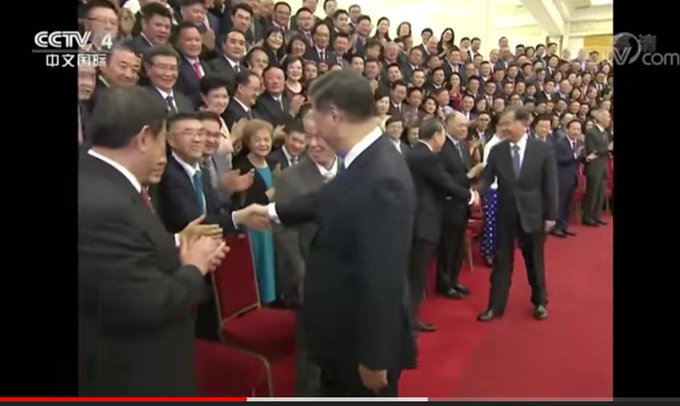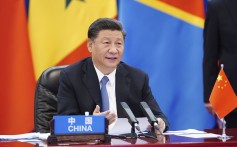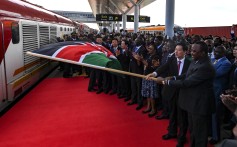
As reported by The Guardian and others:
The Australian spy agency Asio has raided the Sydney home of the New South Wales upper house Labor MP Shaoquett Moselmane, searching for evidence to support allegations of a Chinese government plot to influence a serving politician.
The controversial MP has been a strong supporter of China publicly and has come under scrutiny for his recent praise of China’s handling of the coronavirus pandemic.
Meanwhile ASIO seems happy to ignore the matter of Zhu Minshen and Top Group, despite all that is available in the public domain:
Zhu Minshen announces that NSW LPAB review "went smoothly": AG NSW Mark Speakman and officers unconcerned by Clive Hamilton's disclosures of threats, intimidation and defiance of AFP directives ,share price collapse
Thursday, January 23, 2020
Zhu Minshen & Top Group's business partner iFlytek blacklisted by the US Gov for human rights violations:NSW LPAB and Law Council Australia continue to supervise Zhu & Top's activities
by Ganesh Sahathevan
China’s AI champion iFlyTek brushes off US entity list inclusion with bullish profit forecast
In October 2019 Reuters reported that the China's iFlytek had been blacklisted by the US Government for "human rights violations and abuses in the implementation of China’s campaign of repression, mass arbitrary detention, and high-technology surveillance against Uighurs, Kazakhs, and other members of Muslim minority groups.”
The blacklisting " bars the firms from buying components from U.S. companies without U.S. government approval."
In August 2019 this writer reported that Liberal & Labor donor Minshen Zhu's Top Group had entered into a commercial agreement with iFlytek (see story below).
Despite the above, Top Group and Zhu Minshen continue to remain part of the New South Wales and Australian legal establishment as a result of the NSW LPAB and Law Society Australia granting Zhu the"first and only" right to issue LLB degrees issued a private company which is not a university. With that right comes duties and obligations conferred pursuant to Australian laws that can be used to determine who may or may not practise law in Australia, even after degrees have been conferred.
Being under the patronage and supervision of the NSW LPAB, which is chaired by the Chief Justice Of NSW Tom Bathurst, and the Law Council of Australia provides Zhu and his Top Group a high degree of credibility and status in Australia, regardless of what anyone might think of the iFlytek MOU.
The NSW LPAB, the Law Council and the Chief Justice have all chosen to ignore the growing number of questions about their dealings with Zhu Minshen and Top Group.
END
In October 2019 Reuters reported that the China's iFlytek had been blacklisted by the US Government for "human rights violations and abuses in the implementation of China’s campaign of repression, mass arbitrary detention, and high-technology surveillance against Uighurs, Kazakhs, and other members of Muslim minority groups.”
The blacklisting " bars the firms from buying components from U.S. companies without U.S. government approval."
In August 2019 this writer reported that Liberal & Labor donor Minshen Zhu's Top Group had entered into a commercial agreement with iFlytek (see story below).
Despite the above, Top Group and Zhu Minshen continue to remain part of the New South Wales and Australian legal establishment as a result of the NSW LPAB and Law Society Australia granting Zhu the"first and only" right to issue LLB degrees issued a private company which is not a university. With that right comes duties and obligations conferred pursuant to Australian laws that can be used to determine who may or may not practise law in Australia, even after degrees have been conferred.
Being under the patronage and supervision of the NSW LPAB, which is chaired by the Chief Justice Of NSW Tom Bathurst, and the Law Council of Australia provides Zhu and his Top Group a high degree of credibility and status in Australia, regardless of what anyone might think of the iFlytek MOU.
The NSW LPAB, the Law Council and the Chief Justice have all chosen to ignore the growing number of questions about their dealings with Zhu Minshen and Top Group.
END
Wednesday, August 28, 2019
Liberal & Labor donor Minshen Zhu's Top Group will fund business with China's iFlytek using Commonwealth of Australia FEE HELP funding: iFlytek is being considered for blacklisting in the US, like Huwaei
by Ganesh Sahathevan
China-HK protest on Australian campuses but not at Minshen Zhu controlled campuses-Are legal profession admission rules being used (again ) to suppress complaints and protests
The Sydney based Hong Kong listed Top Education Group Ltd,which is funded in part by Australian Commonwealth Government FEE HELP courtesy of among other things the "first and only"license granted a private entity to issue LLB degrees, informed the Hong Stock Exchange yesterday that Top had entered into a MOU with two Chinese state supported companies, iFlytek, and its associated company , Jingle Magic:
The board (the “Board”) of directors (the “Directors”) of the Company is pleased to announce that, on 21 August 2019, the Company signed a memorandum of understanding (the “MoU”) on the potential cooperation of the international educational artificial intelligence project with iFlytek Co Ltd. (“iFLYTEK”) and Jingle Magic (Beijing) Technology Co., Ltd. (“Jingle Magic”). Pursuant to MoU, TOP will introduce smart classroom products and related educational artificial intelligence product systems and services from iFLYTEK and Jingle Magic, and iFLYTEK and Jingle Magic will assist TOP in evaluating the smart campus plan, work out an executable plan by leveraging the strengths of iFLYTEK and Jingle Magic, and help TOP complete the development of smart campus.
The Board believes that this cooperation will take full advantage of the technological strength of iFLYTEK and Jingle Magic in artificial intelligence and assist TOP to achieve 2 its own strategic goals and build Australia's first higher education institute with full coverage of artificial intelligence, which will become one of the symbols for the integrating education with industrial production. It is also a demonstration base of an overseas joint smart campus for iFLYTEK and Jingle Magic. The extension coverage of the artificial intelligence higher education will extend to TOP’s possible expansion targets and related cooperative teaching platforms in China.
In July tis year the South China Morning Post detailed iFlytek links with the Chinese Government:
This deal further confirms the Communist Party China links of Top Group's CEO and major shareholder, Minshen Zhu.
It raises further questions about the approvals provided him by the AG NSW Mark Speakman, whose portfolio included security.
END
Enterprises
China’s voice recognition champion iFlytek gets US$407 million funding boost from state investors
Company to invest 2.05 billion yuan in its AI speech platform, with 1.18 billion yuan coming from proceeds of the private placementSarah Dai
Published: 11:48am, 17 Jul, 2019
iFlytek, China’s national champion in voice recognition, has raised 2.8 billion yuan (US$407 million) via a private placement that brought in money from a state-backed industry fund and several provincial government funds.
The Shenzhen-listed company will use the proceeds to bankroll research in open platforms for smart speech, so-called next generation cognitive technology, and service robots, it said in a stock exchange filing on Wednesday.
The placement has pulled in investors including Anhui Development Investment Company, Anhui Railway Development Fund, Anhui Smart Voice and Artificial Intelligence Venture Capital, as well as an investment fund for state-owned companies under government-controlled investment vehicle China Reform Holdings.
Founded in 1999 and headquartered in Hefei, the capital of the eastern Chinese province of Anhui, iFlytek has established itself as the country’s foremost developer of advanced speech recognition, speech evaluation and natural language processing technologies.
In 2017 the company was handpicked by the Chinese government to spearhead the country’s development in voice intelligence and take the lead in building an “open innovation platform”.
The firm’s AI speech open platform is expected to be the biggest beneficiary of the new funds as iFlytek intends to invest 2.05 billion yuan in that project, with 1.18 billion yuan the amount coming from proceeds of the private placement.
iFlytek’s focus on AI technology and its state support has put the company at the forefront of the tech war being waged between the US and China, with Washington deliberating whether to add iFlytek to a blacklist that would bar it from purchasing US components or software without US government approval, Bloomberg reported in May citing a person familiar with the matter.
“Huawei and iFlytek are very similar in DNA. Both are the kind of companies persistent enough to take 10 years to sharpen one sword,” Hu Yu, who takes the title of rotating president of iFlytek, said at an public event in May.
Huawei Technologies, China’s telecoms national champion, was put on the blacklist in May although US President Donald Trump softened that stance after talks with Xi Jinping at the G20 summit in June.
China Asset Management and Harvest Fund Management, the country’s two top mutual funds, also backed the iFlytek offering, according to the filing. The new investors have a one year lock up period and cannot sell their shares until July 18 next year.
SEE ALSO
A few other Australians can be spotted in footage of the event, which was attended by Xi Jinping and Politburo Standing Committee Member Wang Yang. Here is Zhu Minshen, who famously paid Sam Dastyari's travel bill, shaking hands with Papa Xi 4/-Alex Joske
China-HK protest on Australian campuses but not at Minshen Zhu controlled campuses-Are legal profession admission rules being used (again ) to suppress complaints and protests
The Sydney based Hong Kong listed Top Education Group Ltd,which is funded in part by Australian Commonwealth Government FEE HELP courtesy of among other things the "first and only"license granted a private entity to issue LLB degrees, informed the Hong Stock Exchange yesterday that Top had entered into a MOU with two Chinese state supported companies, iFlytek, and its associated company , Jingle Magic:
The board (the “Board”) of directors (the “Directors”) of the Company is pleased to announce that, on 21 August 2019, the Company signed a memorandum of understanding (the “MoU”) on the potential cooperation of the international educational artificial intelligence project with iFlytek Co Ltd. (“iFLYTEK”) and Jingle Magic (Beijing) Technology Co., Ltd. (“Jingle Magic”). Pursuant to MoU, TOP will introduce smart classroom products and related educational artificial intelligence product systems and services from iFLYTEK and Jingle Magic, and iFLYTEK and Jingle Magic will assist TOP in evaluating the smart campus plan, work out an executable plan by leveraging the strengths of iFLYTEK and Jingle Magic, and help TOP complete the development of smart campus.
The Board believes that this cooperation will take full advantage of the technological strength of iFLYTEK and Jingle Magic in artificial intelligence and assist TOP to achieve 2 its own strategic goals and build Australia's first higher education institute with full coverage of artificial intelligence, which will become one of the symbols for the integrating education with industrial production. It is also a demonstration base of an overseas joint smart campus for iFLYTEK and Jingle Magic. The extension coverage of the artificial intelligence higher education will extend to TOP’s possible expansion targets and related cooperative teaching platforms in China.
In July tis year the South China Morning Post detailed iFlytek links with the Chinese Government:
iFlytek’s focus on AI technology and its state support has put the company at the forefront of the tech war being waged between the US and China, with Washington deliberating whether to add iFlytek to a blacklist that would bar it from purchasing US components or software without US government approval, Bloomberg reported in May citing a person familiar with the matter.
“Huawei and iFlytek are very similar in DNA. Both are the kind of companies persistent enough to take 10 years to sharpen one sword,” Hu Yu, who takes the title of rotating president of iFlytek, said at an public event in May.
This deal further confirms the Communist Party China links of Top Group's CEO and major shareholder, Minshen Zhu.
It raises further questions about the approvals provided him by the AG NSW Mark Speakman, whose portfolio included security.
END
Enterprises
China’s voice recognition champion iFlytek gets US$407 million funding boost from state investors
Company to invest 2.05 billion yuan in its AI speech platform, with 1.18 billion yuan coming from proceeds of the private placementSarah Dai
Published: 11:48am, 17 Jul, 2019
iFlytek, China’s national champion in voice recognition, has raised 2.8 billion yuan (US$407 million) via a private placement that brought in money from a state-backed industry fund and several provincial government funds.
The Shenzhen-listed company will use the proceeds to bankroll research in open platforms for smart speech, so-called next generation cognitive technology, and service robots, it said in a stock exchange filing on Wednesday.
The placement has pulled in investors including Anhui Development Investment Company, Anhui Railway Development Fund, Anhui Smart Voice and Artificial Intelligence Venture Capital, as well as an investment fund for state-owned companies under government-controlled investment vehicle China Reform Holdings.
Founded in 1999 and headquartered in Hefei, the capital of the eastern Chinese province of Anhui, iFlytek has established itself as the country’s foremost developer of advanced speech recognition, speech evaluation and natural language processing technologies.
In 2017 the company was handpicked by the Chinese government to spearhead the country’s development in voice intelligence and take the lead in building an “open innovation platform”.
The firm’s AI speech open platform is expected to be the biggest beneficiary of the new funds as iFlytek intends to invest 2.05 billion yuan in that project, with 1.18 billion yuan the amount coming from proceeds of the private placement.
iFlytek’s focus on AI technology and its state support has put the company at the forefront of the tech war being waged between the US and China, with Washington deliberating whether to add iFlytek to a blacklist that would bar it from purchasing US components or software without US government approval, Bloomberg reported in May citing a person familiar with the matter.
“Huawei and iFlytek are very similar in DNA. Both are the kind of companies persistent enough to take 10 years to sharpen one sword,” Hu Yu, who takes the title of rotating president of iFlytek, said at an public event in May.
Huawei Technologies, China’s telecoms national champion, was put on the blacklist in May although US President Donald Trump softened that stance after talks with Xi Jinping at the G20 summit in June.
China Asset Management and Harvest Fund Management, the country’s two top mutual funds, also backed the iFlytek offering, according to the filing. The new investors have a one year lock up period and cannot sell their shares until July 18 next year.
SEE ALSO
The reports below from Hong Kong' s AA Stock Financial News quote Top Education Institute's Minshen Zhu informing investors in Hong Kong that he expects to increase fees at Top by 5-10% per annum.
Top also expects local Australian students to constitute 30% of its student population and this will provide Top with a steady Commonwealth funded cashflow for Top has been granted access to Commonwealth funding, in the form of Commonwealth student fee assistance.
Top also expects local Australian students to constitute 30% of its student population and this will provide Top with a steady Commonwealth funded cashflow for Top has been granted access to Commonwealth funding, in the form of Commonwealth student fee assistance.
The Commonwealth Department Of Education has made clear to this writer, in response to queries, that it will not object to private colleges charging any amount in fees; the Department considers only the decision by students to bear the debt to the Commonwealth to be of relevance.
However, despite the guaranteed Government funded cashflow Top's annual operating cash flows are barely positive,and profit margins have been declining.
(See Bloomberg data https://www.bloomberg.
Approvals from the Chairman TEQSA,Nick Saunders and the LPAB NSW,which is overseen by the AG NSW and chaired by Chief Justice of the Supreme Court NSW are critical to Top's business success. Both have refused to answer queries regarding TOP.
The AG's evasion is particularly troubling for he and his LPAB can and have used Rule 19 of the Legal Profession Uniform Admission Rules 2015 under the Legal Profession Uniform Law to discredit any complaint from law students enrolled at law schools in NSW, and it particular private law colleges. The story below from The Australian 17 January 2019 provides an example.Documents provided readers will show that the background to what was reported in The Australian was a series of complaints and stories about another private college, the College Of Law Sydney,
As with the College of Law, the AG and his LPAB appear not to have taken any action against Top with regards the issues raised in this story in 2016.
See also









